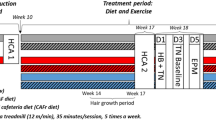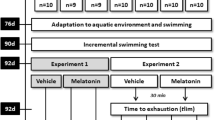Abstract
Although physical exercise and dietary restriction can be both used to induce energy deficits, they have been suggested to favor different compensatory appetitive responses. While dietary restriction might favor increased subsequent energy intake and appetite sensations, such compensatory responses have not been observed after a similar deficit by exercise. The present work provides a first overview of the actual evidences discussing the effects of iso-energetic deficits induced by exercise versus dietary restriction on subsequent energy intake, appetite sensations, and on the potentially involved hedonic and physiological mechanisms.
This is a preview of subscription content, access via your institution
Access options
Subscribe to this journal
Receive 12 print issues and online access
$259.00 per year
only $21.58 per issue
Buy this article
- Purchase on Springer Link
- Instant access to full article PDF
Prices may be subject to local taxes which are calculated during checkout

Similar content being viewed by others
References
Thivel D, Finlayson G, Blundell JE. Homeostatic and neurocognitive control of energy intake in response to exercise in pediatric obesity: a psychobiological framework. Obes Rev. 2019;20:316–24.
Blundell JE, Gibbons C, Caudwell P, Finlayson G, Hopkins M. Appetite control and energy balance: impact of exercise. Obes Rev. 2015;16:67–76.
Schubert MM, Desbrow B, Sabapathy S, Leveritt M. Acute exercise and subsequent energy intake. a meta-analysis. Appetite 2013;63:92–104.
Donnelly JE, Herrmann SD, Lambourne K, Szabo AN, Honas JJ, Washburn RA. Does increased exercise or physical activity alter ad-libitum daily energy intake or macronutrient composition in healthy adults? A systematic review. PLoS One. 2014;9:e83498.
Thivel D, Rumbold PL, King NA, Pereira B, Blundell JE, Mathieu ME. Acute post-exercise energy and macronutrient intake in lean and obese youth: a systematic review and meta-analysis. Int J Obes. 2016;40:1469–79.
Beaulieu K, Oustric P, Finlayson G. The impact of physical activity on food reward: review and conceptual synthesis of evidence from observational, acute, and chronic exercise training studies. Curr Obes Rep. 2020;9:63–80.
Blundell JE, King NA. Physical activity and regulation of food intake: current evidence. Med Sci Sports Exerc. 1999;31:S573–83.
Blundell JE, Gibbons C, Beaulieu K, Casanova N, Duarte C, Finlayson G, et al. The drive to eat in homo sapiens: energy expenditure drives energy intake. Physiol Behav. 2020;219:112846.
King NA, Burley VJ, Blundell JE. Exercise-induced suppression of appetite: effects on food intake and implications for energy balance. Eur J Clin Nutr. 1994;48:715–24.
King NA, Lluch A, Stubbs RJ, Blundell JE. High dose exercise does not increase hunger or energy intake in free living males. Eur J Clin Nutr. 1997;51:478–83.
King JA, Miyashita M, Wasse LK, Stensel DJ. Influence of prolonged treadmill running on appetite, energy intake and circulating concentrations of acylated ghrelin. Appetite 2010;54:492–8.
Green SM, Burley VJ, Blundell JE. Effect of fat- and sucrose-containing foods on the size of eating episodes and energy intake in lean males: potential for causing overconsumption. Eur J Clin Nutr. 1994;48:547–55.
Hubert P, King NA, Blundell JE. Uncoupling the effects of energy expenditure and energy intake: appetite response to short-term energy deficit induced by meal omission and physical activity. Appetite 1998;31:9–19.
King JA, Wasse LK, Ewens J, Crystallis K, Emmanuel J, Batterham RL, et al. Differential acylated ghrelin, peptide YY3-36, appetite, and food intake responses to equivalent energy deficits created by exercise and food restriction. J Clin Endocrinol Metab. 2011;96:1114–21.
Borer KT, Wuorinen E, Ku K, Burant C. Appetite responds to changes in meal content, whereas ghrelin, leptin, and insulin track changes in energy availability. J Clin Endocrinol Metab. 2009;94:2290–8.
Alajmi N, Deighton K, King JA, Reischak-Oliveira A, Wasse LK, Jones J, et al. Appetite and energy intake responses to acute energy deficits in females versus males. Med Sci Sports Exerc. 2016;48:412–20.
Thivel D, Finlayson G, Miguet M, Pereira B, Duclos M, Boirie Y, et al. Energy depletion by 24-h fast leads to compensatory appetite responses compared with matched energy depletion by exercise in healthy young males. Br J Nutr. 2018;120:583–92.
Cameron JD, Goldfield GS, Riou ME, Finlayson GS, Blundell JE, Doucet E. Energy depletion by diet or aerobic exercise alone: impact of energy deficit modality on appetite parameters. Am J Clin Nutr. 2016;103:1008–16.
Thivel D, Doucet E, Julian V, Cardenoux C, Boirie Y, Duclos M. Nutritional compensation to exercise- vs. diet-induced acute energy deficit in adolescents with obesity. Physiol Behav. 2017;176:159–64.
Ueda SY, Yoshikawa T, Katsura Y, Usui T, Fujimoto S. Comparable effects of moderate intensity exercise on changes in anorectic gut hormone levels and energy intake to high intensity exercise. J Endocrinol. 2009;203:357–64.
Franz MJ, VanWormer JJ, Crain AL, Boucher JL, Histon T, Caplan W, et al. Weight-loss outcomes: a systematic review and meta-analysis of weight-loss clinical trials with a minimum 1-year follow-up. J Am Diet Assoc. 2007;107:1755–67.
Acknowledgements
Jams King was supported by the National Institute for Health Research (NIHR) Leicester Biomedical Research Centre. The views expressed are those of the authors and not necessarily those of the NHS, the NIHR or the Department of Health and Social Care. David Thivel is supported by the French National University Institute (IUF° throught his 2017–2021 Junior affiliation.
Author information
Authors and Affiliations
Contributions
While DT and JK led the writing of this paper, all the co-authors significantly and equally contributed to this manuscript.
Corresponding author
Ethics declarations
Conflict of interest
The authors declare that they have no conflict of interest.
Additional information
Publisher’s note Springer Nature remains neutral with regard to jurisdictional claims in published maps and institutional affiliations.
Rights and permissions
About this article
Cite this article
Thivel, D., Metz, L., Julian, V. et al. Diet- but not exercise-induced iso-energetic deficit induces compensatory appetitive responses. Eur J Clin Nutr 75, 1425–1432 (2021). https://doi.org/10.1038/s41430-020-00853-7
Received:
Revised:
Accepted:
Published:
Issue Date:
DOI: https://doi.org/10.1038/s41430-020-00853-7



